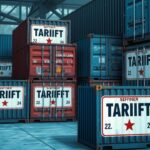Politics
ARK, ASIA, BILL CASSIDY, CENTER SQUARE, CHINA, CHINESE COMMUNIST PARTY, COMMUNIST PARTY, DONALD TRUMP, ECONOMICS, GEOPOLITICS, MEXICO, MIKE GALLAGHER, NORTH AMERICA, SELECT COMMITTEE ON, SHEIN, TARIFFS, TEMU, TOM COTTON, TRADE, U. S, U. S. SELECT COMMITTEE, UNITED STATES, US-CHINA RELATIONS, WHITE HOUSE, WISCONSIN
Nia Simpson
Impact of Trump’s Tariff Plan: New Taxes on Chinese Packages Starting May 2023
President Trump’s new trade policy eliminates the de minimis tax exemption for Chinese packages, effective May 2, 2023. Lawmakers argue this change will combat unfair competition from Chinese companies and address issues of illegal products and practices. However, concerns arise regarding increased costs for American consumers as tariffs are implemented on small imports.
President Donald Trump has implemented a series of reciprocal tariffs aimed at various nations, which includes the noteworthy termination of the tax exemption for small packages shipped from China, such as those from Shein and Temu. This change will take effect on May 2, 2023, ending the de minimis exemption.
U.S. Senator Tom Cotton (R-Ark.) criticized the exemption for enabling Chinese companies to flood the U.S. market with inferior goods, including illegal products. Senator Bill Cassidy (R-La.) reiterated this concern, claiming that American businesses are unable to compete against Chinese firms accused of utilizing slave labor to provide cheaper products.
The White House stated de minimis shipments currently represent 92% of cargo entering the U.S. and outlined that these shipments will now be subject to duties equivalent to either 30% of their value or $25 per item, which will increase to $50 per item in 2025. This measure applies instead of any previous duties placed on imports.
Evidence supports allegations of slave labor regarding Chinese companies. The U.S. Select Committee on the Chinese Communist Party revealed shocking findings in June 2023, noting that companies like Temu have insufficient measures in place to ensure their supply chains are free from slave labor. The report indicates that both Temu and Shein exploit the de minimis loophole to evade scrutiny in their imported goods.
The stock market reacted negatively following the tariff announcement, with experts divided on the tariffs’ anticipated effects on consumer prices and domestic production levels. Proponents argue the tariffs intend to equalize trade conditions, while critics predict increased costs will burden American consumers.
Critics, such as Joel Griffith from Advancing American Freedom, warn that these tariffs may lead to an annual financial impact exceeding $3,500 for families, negating years of income gains. Historic data note that free trade agreements have generally improved family incomes and enhanced manufacturing output in the U.S.
While closing the de minimis exemption has received some support, it faces critiques as well. Inu Manak from the Council on Foreign Relations articulated that the de minimis rule was created by Congress to avoid the administrative burden of collecting tariffs on low-value shipments, which can raise costs for U.S. businesses and consumers.
In conclusion, the recent termination of the de minimis tax exemption for small packages shipped from China, effective May 2, 2023, marks a significant shift in U.S. trade policy. While some lawmakers assert this move will protect American interests from unfair competition and illegal products, the potential financial burden on U.S. consumers raises concerns. The implications of such tariffs on families and the economy remain a point of contention, highlighted by various experts and critics of the policy.
Original Source: heartlandernews.com








Post Comment